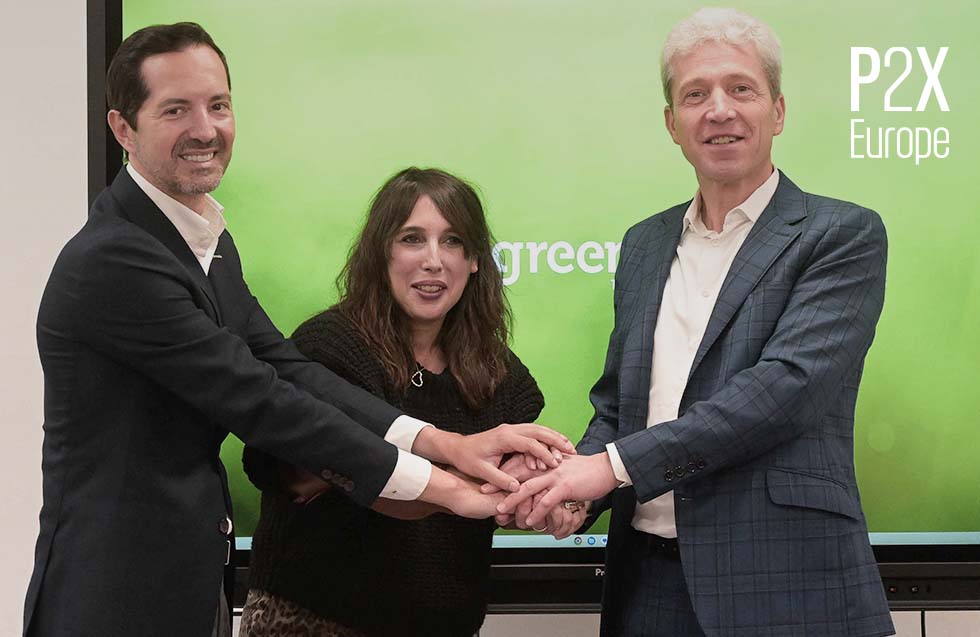Greenalia and P2X-Europe request that their Breogan project, to produce eFuels in Galicia, be classified as a Priority Business Initiative

- The development of this project, designed to produce synthetic crude oil for aviation, is planned for the Curtis-Teixeiro industrial area (Galicia, Spain) where Greenalia has its biomass plant (50 MW).
- This is the first plant that will integrate a totally innovative system to produce eFuels, combining biogenic CO2 from the biomass plant and green hydrogen
- Project Breogan represents a major step towards energy autonomy and sustainability in Galicia, Spain, and Europe, positioning the region as a leader in the production and commercialisation of synthetic fuels.
After signing the MOU (Memorandum of Understanding), the companies Greenalia and P2X-Europe, take a step further in their alliance and have formally committed to enter the next planning phase in their partnership, which is set to redefine the future of sustainable energy in a groundbreaking collaboration for the construction of an innovative industrial Power-to-Liquid (PtL) plant in Galicia. With the aim of streamlining all the procedures for its implementation, steps have already been taken to qualify it as a Priority Business Initiative (PBI) by the Xunta de Galicia.
The details of the Project, Breogán, were explained by the CEOs of Greenalia and P2X-Europe, Manuel García and Detlev Woesten, respectively, during a meeting with the Regional Minister of Economy, Industry and Innovation, María Jesús Lorenzana Somoza, as part of a visit to Greenalia’s biomass plant in Curtis-Teixeiro. This facility is fundamental to this project, since the capture of its biogenic CO2, together with green hydrogen, which will be produced on the adjoining land, will produce green synthetic crude oil.
Project Breogan is designed to produce 20,000 tonnes/year of synthetic crude, requiring 70,000 tonnes/year of biogenic CO2 captured from Greenalia’s biogenic feedstock-based production facility. This cutting-edge facility will produce synthetic hydrocarbons at large scale, ushering in a new era of carbon-neutral production and climate action. The refined products, such as eSAF, eDiesel, and specialty chemicals like eWaxes, are poised to revolutionise the aviation, transport, and chemical industries.
The construction and commissioning of this project is estimated to require an investment of over 200 million euros.
The Curtis plant (50 MW), one of the 3 largest installed in southern Europe, generates approximately 375 GWh per year. This production of clean and renewable energy is equivalent to the consumption of 115,000 Galician households.
This project is an extremely important step forward in the decarbonisation process, as the alliance between P2X and GRN integrates the entire value chain. It includes from the supply of raw materials, which starts in the forest with the collection of biomass, through the production of hydrogen and the synthesis reaction, to the introduction to the market and marketing of improved end products. The CO2 capture alone for this project is equivalent to planting 1 million trees.
The Breogán project is the first international project that will bring synthetic carbon-neutral crude oil production to commercial scale, building on existing pilot plants owned by the P2X-Europe group in Germany and operating successfully, paving the way for rapid implementation and automation of the project.
The project is expected to start operating in 2027, for which an agile process is needed, guaranteeing all legal and environmental security, but allowing the acceleration of the implementation of an initiative that is clearly strategic for the Galician community.
CEO of P2X-Europe, Detlev Woesten, summarises: “We are very pleased to see the ongoing commitment from this German-Spanish partnership that has eventually led to a more robust agreement for project Breogan. The production of synthetic products guarantees the supply of CO2 neutral crude to P2X’s parent companies Mabanaft and H&R Group, ready to be refined for their respective market needs.”
We welcome this very ambitious commitment to the decarbonisation of the economy in Galicia, which will also generate a highly innovative ecosystem in the area, stressed Manuel García, CEO of Greenalia, who added that “we are facing a driving project that will generate quality employment, collaborate with the protection of the environment and require significant investment that will have an economic impact on this eminently rural environment“.
This milestone initiative promises to set a benchmark in the production and commercialisation of synthetic fuels, making Galicia a beacon of sustainability that extends its influence across Europe. The production of green hydrogen, synthetic hydrocarbons, and eFuels is a significant step toward strategic energy autonomy for Galicia, Spain, and Europe as a whole.
Aviation emissions reductions needed
The aviation industry’s dependence on fossil fuels and long fleet turnover times makes it difficult to decarbonise and rapidly reduce GHG emissions, which account for about 12% of the transport industry’s total CO emissions.
It is in this context of the need to move towards more sustainable fuels that the Breogan Project is framed. It is fully aligned with the European Green Pact and the requirements of the ReFuelEU Aviation Initiative, which promotes the development and deployment of sustainable aviation fuels.
The 20,000 tonnes of synthetic hydrocarbons produced from synthetic crude oil are expected to progressively replace conventional, fossil-based paraffin in combustion turbines, generating net carbon reductions and avoiding tonnes of CO2 emissions.




